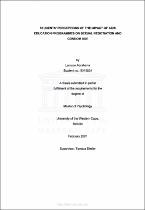Students' perceptions of the impact of aids education programmes on sexual negotiation and condom use
Abstract
As we embark on a new millennium, Human lmmunodeficiency Virus (HlV) and Acquired lmmune Deficiency Syndrome (AIDS) remains one of the most dangerous threats to the well-being and health of communities all over the world. In Africa (as in other developing nations) this threat is of even more concern as people on this continent are grappling with other complex problems such as famine, disease and civil war. Although AIDS was initially identified as a homosexual male disease, its consequent spread to the heterosexual population and the incidence of HIV infection among this population is rapidly increasing. ln Africa, heterosexual intercourse has become the major mode of transmission, as infection by other means are minimal. Since this disease also increasingly reflects the social inequalities evident in our society, it has ensured that especially young black South Africans (and black women in particular), are vulnerable to this disease. The present research has as its primary aim an exploration of students' perceptions of the impact of AIDS education programmes on sexual negotiation and condom use among this population. A qualitative research design was utilised to explore participants' experiences of how living in the AIDS era has impacted on their sexual behaviour. Data was primarily gathered through three semi-structured focus groups and a thematic analysis was carried out on the transcriptions of the data. Three major themes, including a number of subthemes, emerged, suggesting that most students do not practice safe sex in any form. Although many students argued that safe sex was important, their response suggests that despite the AIDS campaigns, many still do not utilise safe sex practices. introducing safe sex options was regarded as impacting negatively on a relationship, with a resultant lack of trust and issues of fidelity being raised. ln addition, condoms were reportedly disliked, as they were perceived to decrease sexual pleasure. Safe sex was also more likely to be abandoned in longer-term relationships, especially among the women in the study, as the partner was regarded as trustworthy the longer he was known. For the men in the study sexual history was more important than relationship length. This study also confirmed that many of the myths surrounding AIDS was still prevalent, and used as barriers to safe sex and condom use. These included a denial of the disease altogether as well as a denial of the seriousness of HlV. Underlying al! of these barriers to safe sex was the relative powerlessness for many women to demand safe sex from their partners, women's role within these relationships, and the values and norms which further disempower women.

